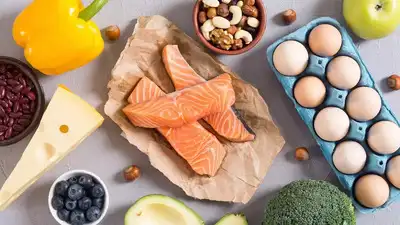ARTICLE AD BOX

B for brain, B for B-complex!As Phoebe would have pointed out, ‘coincidence’?Scientific evidence suggests it’s definitely not!Emerging research shows that beyond the well-known B6 and B12, the full vitamin B-complex, including B1 (thiamine), B2 (riboflavin), B3 (niacin), B5 (pantothenic acid), B7 (biotin), and B9 (folate), plays vital roles in keeping your brain energized and resilient.
Studies reveal that these B vitamins support energy production, neurotransmitter formation, and DNA repair and may even slow age-related cognitive decline.In fact, well-known neuroscientist Robert W.B. Love, who specializes in helping people prevent Alzheimer’s disease with science, agrees.So, let’s explore how these B vitamins help brain function, what the science says, and fun, practical ways to add them to your diet, even if you're skipping supplements!
Beyond B6 and B12: B-complex and brain benefits
The B-complex group includes eight water-soluble vitamins essential to brain metabolism, energy, and overall function:Thiamine (B1) helps convert glucose into energy for the brain and supports normal nervous system function.Riboflavin (B2) aids cellular energy production and acts as an antioxidant supporting brain health.Niacin (B3) helps produce key brain lipids and supports cognitive function.Pantothenic acid (B5) is needed to make coenzyme A, which helps build brain cell components and neurotransmitters.Biotin (B7) supports the metabolism of fats, proteins, and carbohydrates, which are fuel for the brain.Folate (B9) plays a key role in repairing DNA, regulating homocysteine levels, and supporting mental function.
In fact, a large-scale meta-analysis showed that folate intake (not B6 or B12) was significantly associated with a lower risk of dementia, and B-vitamin supplementation slowed cognitive decline.
What research reveals about B-complex (sans B6 and B12)
Brain volume and cognition: Many clinical trials, like VITACOG and FACT, show B-complex vitamins may slow brain shrinkage and improve cognitive performance in those at risk.Mechanisms at work:B-complex vitamins, particularly thiamine (B1), riboflavin (B2), niacin (B3), pantothenic acid (B5), biotin (B7), and folate (B9), are key cofactors in producing energy, aiding neurotransmitter synthesis, and supporting overall cellular metabolism.Mood and mental energy: Studies report that B-complex supplementation (regardless of B6 or B12 inclusion) can reduce fatigue and enhance mood, even in people without deficiencies.Homocysteine link: While B9 (folate) helps lower homocysteine, a compound linked to cognitive decline, research shows that folate alone may not stave off dementia without B12. However, niacin (B3) has independent links to reduced dementia risk through DNA repair and neural function.
How to add B-complex vitamins to your diet
We’ve established the health benefits. Now, how to add these to our daily diet so that we can gain the optimal amount of benefits?Here’s a delicious clean sheet of natural B-complex sources (excluding B6 and B12, but they naturally come along in whole foods):Whole grains and legumes: Lentils, chickpeas, peas, kidney beans, and whole grain bread are packed with B1, B2, B3, B5, and folate. Whole foods give a mix of B vitamins plus fiber, antioxidants, and healthy fats, making absorption smoother and safer.Leafy greens: Spinach, kale, and other greens are rich in riboflavin (B2) and folate (B9).Nuts and seeds: Great sources of various B vitamins, especially biotin (B7) and pantothenic acid (B5).Eggs, dairy, fish, and meat: Contain many B vitamins, although they also include B6 and B12; still, they're helpful for the overall complex.Fortified cereals and nutritional yeast: Excellent for folate and other B vitamins, especially for those on plant-based diets.
How to sneak them into your diet?
Breakfast: Start with oatmeal topped with nuts and banana (for B7), or wholegrain toast with avocado and nutritional yeast.Lunch: Toss leafy greens and beans into a colorful salad, made of spinach, chickpeas, and sunflower seeds.Dinner: Have wholegrain pasta with tomato sauce, sprinkled with nutritional yeast, plus a side of steamed leafy greens.Snacks: Crunchy trail mix of nuts, seeds, and dried fruit.Think of your brain as a curious, always-on explorer that thrives on variety and balance. It thrives on a rich variety of B-complex vitamins, and the list goes well beyond just B6 and B12. Eating colorful, whole foods like legumes, leafy greens, nuts, and wholegrains gives your brain a nourishing buffet of vital nutrients. They help you think clearly, stay energized, and feel brighter. By mixing colorful veggies, whole grains, nuts, beans, and maybe an egg or two, you’re giving your brain its very own power-up team – all without needing extra pills.Disclaimer: This article is intended for informational purposes only and does not constitute medical advice or diagnosis. Always consult a qualified healthcare professional before making any changes to your diet or starting supplements. Neither the author nor the publisher is responsible for any health issues or consequences arising from the use of this information.



.png)
.png)
.png)
















 5 hours ago
5
5 hours ago
5









 English (US) ·
English (US) ·